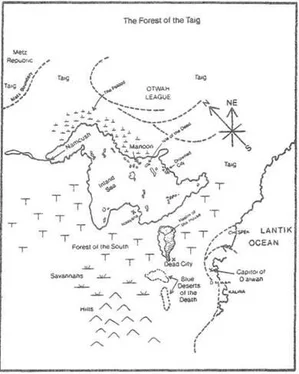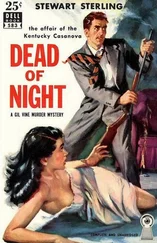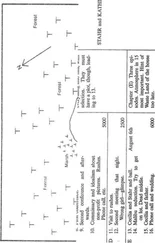Then—there was an instantaneous vacuum, as if a soundless bubble had burst, perhaps somewhere in another alien dimension superimposed upon ours. And then, nothing more. There was only the soughing of the night wind in the reed tops, the hum of countless insect hordes, and the rasping obligate of frog voices.
The black skiff still lay nosed upon the muck, just in front of Hiero’s tunnel. But no hooded figure now stood glaring in at the priest. A heap of colorless rags lay spilled half over the gunwales, and from the clothes, a sticky, oily substance was leaking, covering the now moonlit water with a foul stain. A charnel stench came from the rags, a reek which made the worst efforts of the marsh gases seem like perfume by comparison. Whatever had worn the hooded cloak had returned to its native elements, as foul in its strange death as it had been in life.
Choking at the vile smell, Hiero rose and, putting one foot on the strange little craft, gave it a hearty shove. To his amazement, the skiff did not simply glide off at the force of his push, but instead turned and moved away, in steady progress up the channel down which it had first come. He could see clearly now, for the mists had cleared while he had fought for his life, and he watched the mysterious boat, bearing the remains of its ghastly pilot, sedately turn a corner in the reed banks and vanish. In its strange going, it kept the last secret of the Dweller in the Mist.
Wearily, Hiero looked up at the white moon. The incredible struggle had gone on for at least three hours and yet had seemed like only a few moments. When the Dweller had first appeared, the last sickly light of the fog-shrouded sun still lingered in the west. But the position of the moon showed that it now was not far short of ten o’clock.
He turned and looked down at his two partners in jeopardy. For the first time, he smiled. The bear was swatting mosquitoes in his sleep and growling angrily as he did. Klootz was also asleep, but emitting gargantuan grunts and rumblings, while every inch of his great hide twitched and rippled in an effort to shake off the stinging bugs. Whatever spell they all had been under was completely lifted, that was certain.
The priest said a brief prayer of thanks while he watched the gibbous moon rise still farther. He was still somewhat bemused, and his nervous energy was a long way from returning to normal, while the tremendous dose of psychic strength he had utilized to fight the Dweller had taken a toll. He felt as if he had been riding for two days without a break, at a full gallop.
But it was not time to delay. The mystery of how the horror of the mere had found them was insoluble, at least at present, but one thing was clear, it had had help! That much he had been able to read from its anguished brain, even as he destroyed it and sent it back to the nameless deeps from which it should never have emerged. Somehow, even though he had seen no flier, felt no follower of any kind, the three had been tracked. They must move on and at once, before fresh forces could be assembled for their destruction. Hiero felt fairly sure that the Dweller had not been able, even if willing, to summon any aid in its last moments, because he now knew the strength of the weapon which he had used to slay it. And it had been too preoccupied fighting for its unnatural life to send any messages whatsoever. But if it could find them, by whatever means, so could others. This was a matter on which he would have to take thought, but later on, not now.
He was amused that his new confidence seemed more than temporary. Beyond, and indeed underlying, the amusement was a hard-won feeling of mental power. Hiero knew, without even wondering how he knew, that Abbot Demero or any others of the Council would now be hard-put to stand against him. He hastily put aside such thoughts as vainglorious and impertinent, but they were still there, buried but not dead, in the deep reaches of his mind. He was learning something the Abbey scholars of the mental arts were just beginning to conceive, the fact that mental powers accrete in a geometric, not arithmetical, progression, depending on how much and how well they are used. The two battles Hiero had won, even though the bear had helped decide the first, had given the hidden forces of his already strong mind a dimension and power he would not himself have believed possible. And the oddest thing was, he knew it.
Tired, but feeling somehow wonderful anyway, he roused Gorm and the morse. The bear rose, sniffed the air, and then sent a message. You have fought. It is in the air. (But) there is no blood (and) we have not waked. The enemy which strikes the mind? (Doubt/fear?)
Marveling at the bear’s perceptions, not for the last time, Hiero briefly told him of the Dweller and the fact that it was gone forever.
Gone, that is good. But you are weary, very!! Weary and also troubled (as to how) the enemy found (smelled out) us. Let us go. We (can) eat later.
The big morse nosed him all over and wrinkled his lip in distaste at some smell he seemed to detect on the mud-smeared leather. Hiero saddled him, picking off some more of the big leeches as he did, and in a short time they were on their way again, under the bright moon.
The night’s journey was uneventful. Beyond Klootz’s shying at a small water snake and Gorm’s frightened avoidance of a still pool covered with the scented pale blossoms of some giant nenuphar, nothing occurred.
Dawn saw them camped in yet another clump of vegetation. But it was not a reed bed, but rather a hollow in some large, rounded bushes, with laurellike, dark green leaves. Hiero guessed, and rightly, that the appearance of these woody plants and also the solid ground on which they grew meant that at long last the Palood was coming to an end. He fell asleep as the sun rose in a clear sky. As he dropped off, he dimly heard the morse chewing his cud and, very faintly, far off in the distance, the apparent raucous screeching of many birds.
That evening, after sundown, when the three had all fed, the man and bear sharing pack rations and Klootz thirty pounds of fresh green fodder, Hiero sat for a moment before leaving, All day, while nodding drowsily in the high-cantled saddle, he had ruminated over the problem of pursuit.
How had the Dweller been led to them? The bogs and pools swallowed any tracks on the instant. No hunters trailed them beyond earshot. The three were too sensitive now to allow any undetected surveillance of that sort. Could a flier be so high in the sky at night that they, the travelers, were visible to it? Perhaps a means of seeing at night lay open to the enemy of which the Abbey scientists knew nothing. But he had to dismiss the thought. If that were the case, there was nothing he could do about it anyway, but he did not believe it. No, the fragment of thought he had plucked from the dissolving mind of the living foulness which was the Dweller had seemed to say (or meant) that the creature had been led to its sleeping victims.
Led by what? The priest continued to brood as he saddled Klootz and swung up into the saddle for the night’s ride. And as he rode along under the serene light of the moon and countless stars, he continued to dwell on the problem. The hunting pack of giant water-ferrets had simply followed the trail by means of their keen noses. Or had they? Had they, and perhaps the flier too, some better guide, some aid which allowed them, if not to pinpoint the exact location of the three, at least to know the general position where they might be found? “Damn it, how!” Hiero muttered aloud in vexation. “It’s as if they had a string on me somehow, something on me they could follow, like a bad smell that never grows any fainter.”
His thoughts shifted to the Unclean as he spoke, and suddenly he grunted at his own stupidity. Quickly he ordered a halt. They were crossing a hard-packed sandbar at the time, and the instant Klootz and the bear stopped, Hiero was down on the ground, tearing open one of the saddlebags. His hand seized what he wanted, and he pulled it out into the moonlight.
Читать дальше






